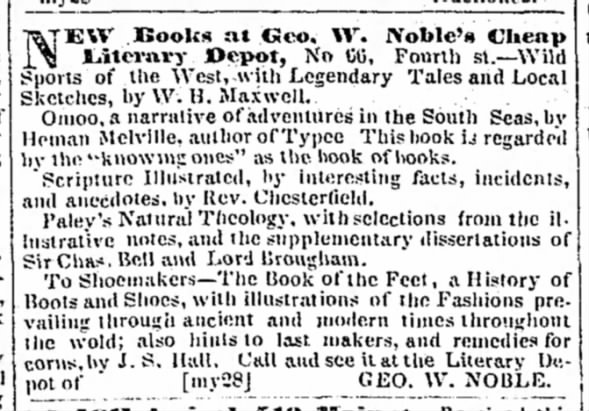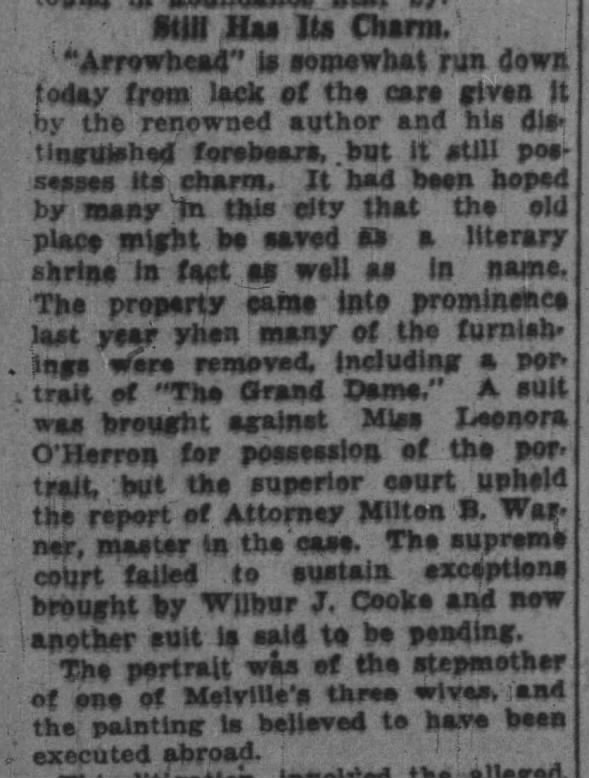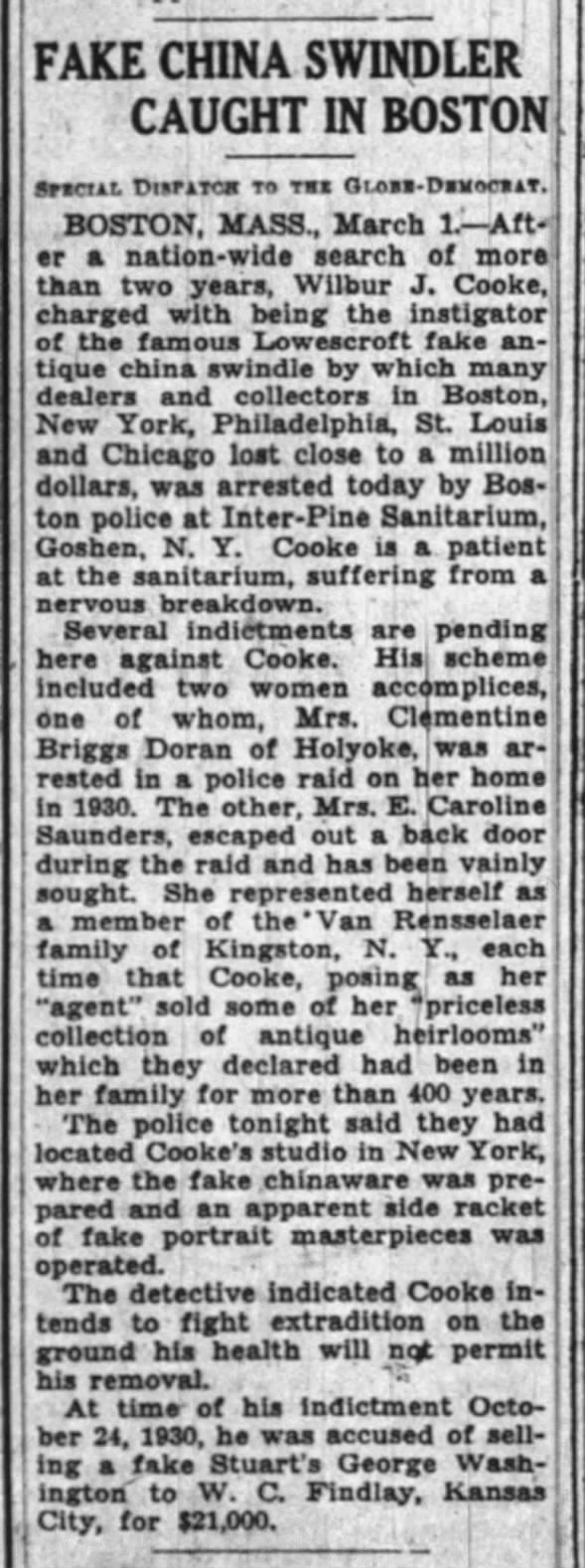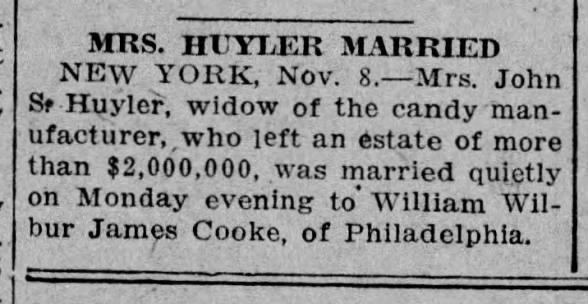Highly favorable, previously unrecorded notices of Herman Melville's first two books appeared in the New York Sunday Dispatch, a weekly newspaper founded late in 1845 by Amor J. Williamson (1823–1867) and William Burns (1818–1850). As noted over at The Walt Whitman Archive, the Sunday Dispatch "published human-interest stories, serials, fiction, poetry, reviews of books and the theater, as well as local and national news items." Certain items transcribed herein reflect a closer than usual personal connection to the author of Typee: A Peep at Polynesian Life and Omoo: A Narrative of Adventures in the South Seas. For instance, the reviewer of Omoo on March 27, 1847 claims to have read both Typee and Omoo in advance of their publication.
Insider knowledge is evidenced also by commentary in the Dispatch of May 23, 1847 on the first number of the weekly American Literary Gazette and New York Evening Mirror. Early advertisements for the "weekly reflex of news, art, science, literature, &c." listed Jedediah B. Auld as editor, assisted by Evert A. Duyckinck, Charles F. Briggs, and Henry Cood Watson.
 |
| Cincinnati Commercial Tribune - May 29, 1847 |
Approving the sympathetic review of Omoo in the inaugural issue of May 21, 1847 along with the sharper focus on literary matters in this ambitious new weekly, the Dispatch positively identified the "independant" and "bold" reviewer as editor Evert A. Duyckinck (spelled "Duykinck"), who had recently left the Literary World. Without naming him, Hershel Parker in Herman Melville: A Biography volume 1, 1819-1851 (Johns Hopkins University Press, 1996) page 518 accurately describes the author of this unsigned, "brilliantly written" piece in the Evening Mirror as "someone high up in the journalistic establishment with a special zeal to defend Melville."
Found on genealogybank.com among digitized pages added within the past week; now accessible also via the Library of Congress on Chronicling America.
TYPEE ; a Residence in the Marquesas, by Herman Melville, New York, and London —Wiley and Putnam.— This is not a work to be dismissed within the limits of an ordinary book notice, and, as we have not room for more extended remarks, this week, we will defer what we have to say to our next, when we will enrich our columns with extracts from Mr Melville's strange and delightful narrative. Meantime we advise all who have the leisure to read it through, to purchase the book.
<https://chroniclingamerica.loc.gov/lccn/sn83030362/1846-04-05/ed-1/seq-2/>
Somewhat curtailed, the promised extracts appeared the following week.
 |
| New York Sunday Dispatch - April 12, 1846 |
Typee.
A RESIDENCE IN THE MARQUESAS.
We did intend to make numerous extracts from this charming book, which we commended to our readers in a brief notice last Sunday.— But our contemporaries have drawn so largely on its pages, as to leave us hardly the share of a gleaner. We, however, transfer to our columns, a portion of the chapter, which, in glancing at the influence exercised by the missionaries in the Sandwich Islands, makes some disclosures, which, we apprehend, will occasion no little surprize among the pious sewing circles of our country. The author of Typee is a bold man, to to tell even the truth concerning the Sandwich Island Mission, for he may be sure of having the mad dog cry of infidel set up against him, at home. We cannot dismiss our readers to the extract, without again commending the whole of Mr. Melville's narrative to their perusal. [Extracts that follow are from the first American edition of Typee chapter 26.]
"Look at Honolulu, the metropolis of the Sandwich Islands! — A community of disinterested merchants, and devoted self-exiled heralds of the Cross, located on the very spot that twenty years ago was defiled by the presence of idolatry. What a subject for an eloquent Bible-meeting orator! Nor has such an opportunity for a display of missionary rhetoric been allowed to pass by unimproved ! — But when these philanthropists send us such glowing accounts of one half of their labors, why does their modesty restrain them from publishing the other half of the good they have wrought? Not until I visited Honolulu was I aware of the fact that the small remnant of the natives had been civilized into draught-horses, and evangelized into beasts of burden. But so it is. They have been literally broken into the traces, and are harnessed to the vehicles of their spiritual instructors like so many dumb brutes!
"Among a multitude of similar exhibitions that I saw, I shall never forget a robust, red-faced, and very lady-like personage, a missionary's spouse, who day after day, for months together, took her regular airings in a little go-cart drawn by two of the islanders, one an old grey-headed man, and the other a rogueish stripling, both being, with the exception of the fig-leaf, as naked us when they were born. Over a level piece of ground this pair of draught bipeds would go with a shambling, unsightly trot, the youngster hanging back all the time like a knowing horse, while the old hack plodded on and did all the work.
"Rattling along through the streets of the town in this stylish equipage, the lady looks about her as magnificently as any queen driven in state to her coronation. A sudden elevation, and a sandy road, however, soon disturb her serenity. The small wheels become imbedded in the loose soil, — the old stager stands tugging and sweating, while the young one frisks about and does nothing—not an inch does the chariot budge. Will the tender-hearted lady, who has left friends and home for the good of the souls of the poor heathen, will she think a little about their bodies and get out, and ease the wretched old man until the ascent is mounted ? Not she; she could not dream of it. To be sure, she used to think nothing of driving the cows to pasture on the old farm in New England; but times have changed since then. So she retains her seat and bawls out, “ Hookee ! hookee !" —pull, pull. The old gentleman, frightened at the sound, labors away harder than ever; and the younger one makes a great show of straining himself, but takes care to keep one eye on his mistress, in order to know when to dodge out of harm's way. At last the good lady loses all patience: “Hookee! hookee!” and rap goes the heavy handle of her huge fan over the naked skull of the old savage; while the young one shies to one side and keeps beyond its range. 'Hookee ! hookee!' again she cries — “ Hookee tata knnaka!”—pull strong, men—but all in vain, and she is obliged in the end to dismount and, sad necessity, actually to walk to the top of the hill.
At the town where this paragon of humility resides, is a spacious and elegant American chapel, where divine service is regularly performed. Twice every Sabbath towards the close of the exercises may be seen a score or two of little wagons ranged along the railing in front of the edifice, with two squalid native footmen in the livery of nakedness standing by each, and waiting for the dismissal of the congregation to draw their superiors home.
"Lest the slightest misconception should arise from anything thrown out in this chapter, or indeed in any other part of the volume, let me here observe, that against the cause of missions in the abstract no Christian can possibly be opposed: it is in truth a just and holy cause. But if the great end proposed by it be spiritual, the agency employed to accomplish that end is purely earthly; and, although the object in view be the achievement of much good, that agency may nevertheless be productive of evil. In short, missionary undertaking, however it may be blessed of Heaven, is in itself but human ; and subject, like everything else, to errors and abuses. And have not errors and abuses crept into the most sacred places, and may there not be unworthy or incapable missionaries abroad, as well as ecclesiastics of a similar character at home? May not the unworthiness or incapacity of those who assume apostolic functions upon the remote islands of the sea more easily escape detection by the world at large than if it were displayed in the heart of a city? An unwarranted confidence in the sanctity of its apostles—a proneness to regard them as incapable of guile—and an impatience of the least suspicion as to their rectitude as men or Christians have ever been prevailing faults in the Church. Nor is this to be wondered at: for subject as Christianity is to the assaults of unprincipled foes, we are naturally disposed to regard everything like an exposure of ecclesiastical misconduct as the offspring of malevolence or irreligious feeling. Not even this last consideration, however, shall deter me from the honest expression of my sentiments.
There is something apparently wrong in the practical operations of the Sandwich Island Mission. Those who from pure religions motives contribute to the support of this enterprise, should take care to ascertain that their donations flowing through many devious channels, at last effect their legitimate object, the conversion of the Hawaiians. I urge this, not because I doubt the moral probity of those who disburse these funds, but because I know that they are not rightly applied. To read pathetic accounts of missionary hardships, and glowing descriptions of conversions, and baptisms taking place beneath palm-trees, is one thing; and to go to the Sandwich Islands and see the missionaries dwelling in picturesque and prettily-furnished coral-rock villas, whilst the miserable natives are committing all sorts of immoralitiy around them, is quite another.
In justice to the missionaries, however, I will willingly admit, that whatever evils may have resulted from their collective mismanagement of the business of the mission, and from the want of vital piety evinced by some of their number, still the present deplorable condition of the Sandwich Islands is by no means wholly chargeable against them. The demoralizing influence of a dissolute foreign population, and the frequent visits of all descriptions of vessels, have tended not a little to increase the evils alluded to. In a word, here, as in every case where civilisation has in any way been introduced among those whom we call savages, she has scattered her vices, and withheld her blessings.
As wise a man as Shakspere has said, that the bearer of evil tidings hath but a losing office; and so I suppose will it prove with me, in communicating to the trusting friends of the Hawaiian Mission what has been disclosed in various portions of this narrative. I am persuaded, however, that as these disclosures will by their very nature attract attention, so they will lead to something which will not be without ultimate benefit to the cause of Christianity in the Sandwich Islands.
I have but one thing more to add in connection with this subject — those things which I have stated as facts will remain facts, in spite of whatever the bigoted or credulous may say or write against them. My reflections, however, on those facts may not be free from error. If such be the case, I claim no further indulgence than should be conceded to every man whose object is to do good."
-- New York Sunday Dispatch, April 12, 1846.
<https://chroniclingamerica.loc.gov/lccn/sn83030362/1846-04-12/ed-1/seq-3/>
The Dispatch editor who supplied the flattering advance notice of Omoo, transcribed below, claimed an exceptionally close tie with the author in being privileged to examine Melville's second book before publication, in manuscript as well as printed proof sheets.
 |
| New York Sunday Dispatch - March 28, 1847 |
LITERARY. — 'TYPEE' AND 'OMOO.' — We learn by the last European steamer, that the new work by Herman Melville, author of Typee, is to be published by Murray, in London, about the first of April, and will be issued at the same time by the Messrs. Harper, of this city. Mr. Murray, in a note to a gentleman of the American legation, expressed a very high opinion of the work; and we have no hesitation in promising that the admirers of Typee will not be disappointed in this new production of its gifted author.
It has been our especial good fortune to read each of these works, in advance of their publication; and the last we perused very carefully, both in the MSS. and proof. Our judgment of Typee was confirmed by that of the whole English and American press, and the author, by the very first stroke of his pen, found himself famous; and Typee will live long after civilization shall have desolated the beautiful Marquesas.
'Omoo,' the forthcoming work, has a wider scope, and a greater variety of interest. Its sea scenes are wonderfully vivid—its descriptions of the island scenery of Polynesia, enchanting; its account of life on shore, principally at the Society Islands, a series of pictures so full of graphic beauties, that they are impressed upon the memory forever. It is a great deal added to one's life to read a book like 'Omoo.'
--New York Sunday Dispatch, March 28, 1847
<https://chroniclingamerica.loc.gov/lccn/sn83030362/1847-03-28/ed-1/seq-2/>
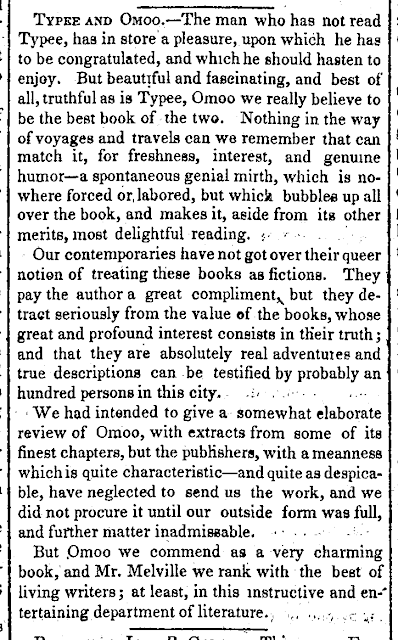 |
| New York Sunday Dispatch - May 9, 1847 |
TYPEE AND OMOO. — The man who has not read Typee, has in store a pleasure, upon which he has to be congratulated, and which he should hasten to enjoy. But beautiful and fascinating, and best of all, truthful as is Typee, Omoo we really believe to be the best book of the two. Nothing in the way of voyages and travels can we remember that can match it, for freshness, interest, and genuine humor—a spontaneous genial mirth, which is nowhere forced or labored, but which bubbles up all over the book, and makes it, aside from its other merits, most delightful reading.
Our contemporaries have not got over their queer notion of treating these books as fictions. They pay the author a great compliment, but they detract seriously from the value of the books, whose great and profound interest consists in their truth; and that they are absolutely real adventures and true descriptions can be testified by probably an hundred persons in this city.
We had intended to give a somewhat elaborate review of Omoo, with extracts from some of its finest chapters, but the publishers, with a meanness which is quite characteristic—and quite as despicable, have neglected to send us the work, and we did not procure it until our outside form was full, and further matter inadmissable.
But Omoo we commend as a very charming book, and Mr. Melville we rank with the best of living writers; at least, in this instructive and entertaining department of literature.
-- New York Sunday Dispatch, May 9, 1847
The next item from the Sunday Dispatch of May 23, 1845 names editor Evert A. Duyckinck as the writer of the highly favorable review of Omoo in the first number of the American Literary Gazette and New York Weekly Mirror (May 21, 1847). Direct quotations establish this as the same unsigned review of Omoo published in the Evening Mirror on May 21, 1847; collected in Herman Melville: The Contemporary Reviews, edited by Brian Higgins and Hershel Parker (Cambridge University Press, 1995; paperback 2009) and transcribed there on pages 108-111. Duyckinck had already resigned when the Literary World reviewed Omoo on May 8, 1847. The review there is probably by his temporary replacement Charles Fenno Hoffman, as Parker suggests in the first volume of Herman Melville: A Biography, page 512.
 |
| New York Sunday Dispatch - May 23, 1847 |
THE AMERICAN LITERARY GAZETTE, is the new prefix title of the New York Weekly Mirror, which paper is placed under the editorial charge of Mr. Evert A. Duykinck, late editor of the Literary World—and now it occurs to us as highly probable, that this may be intended as a rival publication. It is to be devoted more to books and literary criticisms than heretofore, and it promises to be independant. This promise, in the very first number of the series is to a certain extent redeemed; for we have seldom seen a more fearless and decided condemnation of the Missionary enterprize and operations than occurs in the following passage, from a notice of the brilliant works of Herman Melville; Typee and Omoo. Mr. Duyckinck says:— "In sober truth these deluded philanthropists (the missionaries) have, by deluding others, built up an immense institution, requiring annually several hundred thousand dollars to support it; and now they are deluding the natives, with the idea that it is all for their good. This talk about glorious revivals among the heathens, is the veriest nonsense that every emanated from the muddled brains of madmen. A few ignorant islanders are harrangued into a state of mere animal phrenzy, frightened into the grossest absurdities, and finally reduced to a state of slavery—and all this is heralded as a grand triumph of religion!"
He is certainly a bold writer, who in a community like this, dares avow such sentiments; and we begin to think that there is much truth in the report that he was too independant a writer to suit the views of the Booksellers, who publish the Literary World.-- New York Sunday Dispatch, May 23, 1847
<https://chroniclingamerica.loc.gov/lccn/sn83030362/1847-05-23/ed-1/seq-2/>
 |
| New York Sunday Dispatch - July 18, 1847 |
A new play is now being performed at one of the theatres of Paris, founded on "Typee;" the author of which they call the Rev Herman Melville. If the "whig reviewer" see this, he will feel worse than ever. --New York Sunday Dispatch, July 18, 1847.
<https://chroniclingamerica.loc.gov/lccn/sn83030362/1847-07-18/ed-1/seq-2/>
Somehow the Sunday Dispatch knew that Herman Melville was one of four brothers. That is, besides Herman's deceased brother Gansevoort Melville, the Dispatch also had information concerning his younger brothers Allan and Tom.
 |
New York Sunday Dispatch - June 27, 1847
|
TYPEE AND OMOO.— Blackwood's for June has a review of the last of these extraordinary books, extending to fourteen pages, in the best style of that world renowned magazine, in which Herman Melville is called "the phœnix of modern voyagers, sprung, it would seem, from the mingled ashes of Captain Cook and Robinson Crusoe." Yet, while Blackwood's admits the full extent of the merit of these works, and of the general truthfulness of their narratives, it doubts that the author was a sailor before the mast, doubts that his real name is Herman Melville, or that he really has an uncle Gansevoort, of Saratoga County, to whom Omoo is dedicated.To us this is amusing. Mr. Melville, the author of Typee and Omoo, is one of four brothers. The eldest, the late Gansevoort Melville, Esq., died Secretary of the American Legation near the Court of St. James. Herman Melville is apparently twenty eight years old, and has been a sailor before the mast in the Pacific; another brother, younger, if we mistake not, Allan Melville, Esq., is a lawyer and examiner in chancery, in Wall street; and the younger brother of the four, is now, if we mistake not, on a whaling voyage in the Indian Ocean; and may live to write books of voyages which will rival Omoo.
We state these facts thus particularly, because, when there is so much misapprehension abroad, there is likely to be some at home.
-- New York Sunday Dispatch, June 27, 1847
<https://chroniclingamerica.loc.gov/lccn/sn83030362/1847-06-27/ed-1/seq-2/>
On the same page of the Dispatch for June 27, 1847, the brief notice of Blackwood's magazine for June mentions only the article
on our latest and freshest author, Herman Melville, the writer of "Typee" and "Omoo," two works which have taken and will hold rank, and to which reference is made in another column of this paper.
Strong affinity for the "strange and delightful" charms of Typee and the "spontaneous genial mirth" pervading Omoo did not stop the New York Sunday Dispatch from disliking Melville's third book Mardi, and saying so. More on that next time, hopefully.
Related posts:

31 Jan 1876, Mon New York Daily Herald (New York, New York) Newspapers.com








